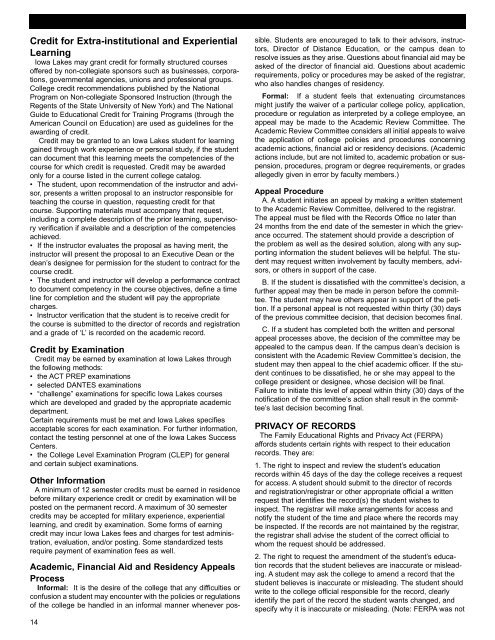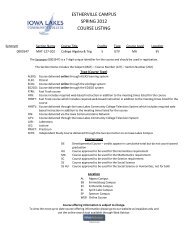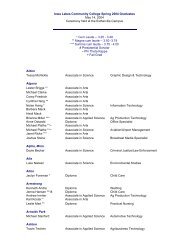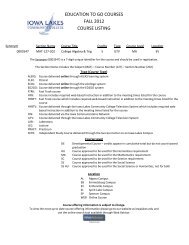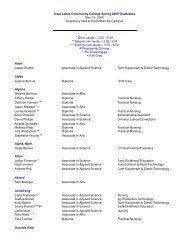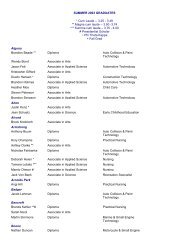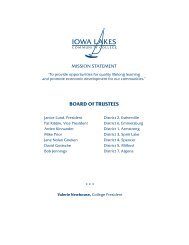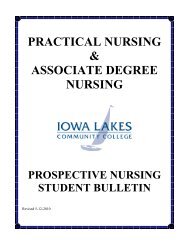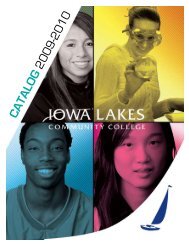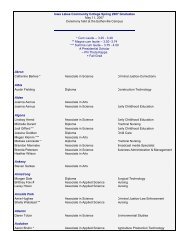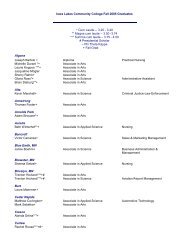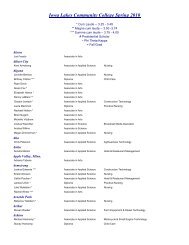Academic Policies & ProceduresCredit for Extra-institutional and ExperientialLearning<strong>Iowa</strong> <strong>Lakes</strong> may grant credit for formally structured coursesoffered by non-collegiate sponsors such as businesses, corporations,governmental agencies, unions and professional groups.<strong>College</strong> credit recommendations published by the NationalProgram on Non-collegiate Sponsored Instruction (through theRegents of the State University of New York) and The NationalGuide to Educational Credit for Training Programs (through theAmerican Council on Education) are used as guidelines for theawarding of credit.Credit may be granted to an <strong>Iowa</strong> <strong>Lakes</strong> student for learninggained through work experience or personal study, if the studentcan document that this learning meets the competencies of thecourse for which credit is requested. Credit may be awardedonly for a course listed in the current college catalog.• The student, upon recommendation of the instructor and advisor,presents a written proposal to an instructor responsible forteaching the course in question, requesting credit for thatcourse. Supporting materials must accompany that request,including a complete description of the prior learning, supervisoryverification if available and a description of the competenciesachieved.• If the instructor evaluates the proposal as having merit, theinstructor will present the proposal to an Executive Dean or thedean’s designee for permission for the student to contract for thecourse credit.• The student and instructor will develop a performance contractto document competency in the course objectives, define a timeline for completion and the student will pay the appropriatecharges.• Instructor verification that the student is to receive credit forthe course is submitted to the director of records and registrationand a grade of ‘L’ is recorded on the academic record.Credit by ExaminationCredit may be earned by examination at <strong>Iowa</strong> <strong>Lakes</strong> throughthe following methods:• the ACT PREP examinations• selected DANTES examinations• “challenge” examinations for specific <strong>Iowa</strong> <strong>Lakes</strong> courseswhich are developed and graded by the appropriate academicdepartment.Certain requirements must be met and <strong>Iowa</strong> <strong>Lakes</strong> specifiesacceptable scores for each examination. For further information,contact the testing personnel at one of the <strong>Iowa</strong> <strong>Lakes</strong> SuccessCenters.• the <strong>College</strong> Level Examination Program (CLEP) for generaland certain subject examinations.Other InformationA minimum of 12 semester credits must be earned in residencebefore military experience credit or credit by examination will beposted on the permanent record. A maximum of 30 semestercredits may be accepted for military experience, experientiallearning, and credit by examination. Some forms of earningcredit may incur <strong>Iowa</strong> <strong>Lakes</strong> fees and charges for test administration,evaluation, and/or posting. Some standardized testsrequire payment of examination fees as well.14Academic, Financial Aid and Residency AppealsProcessInformal: It is the desire of the college that any difficulties orconfusion a student may encounter with the policies or regulationsof the college be handled in an informal manner whenever possible.Students are encouraged to talk to their advisors, instructors,Director of Distance Education, or the campus dean toresolve issues as they arise. Questions about financial aid may beasked of the director of financial aid. Questions about academicrequirements, policy or procedures may be asked of the registrar,who also handles changes of residency.Formal: If a student feels that extenuating circumstancesmight justify the waiver of a particular college policy, application,procedure or regulation as interpreted by a college employee, anappeal may be made to the Academic Review Committee. TheAcademic Review Committee considers all initial appeals to waivethe application of college policies and procedures concerningacademic actions, financial aid or residency decisions. (Academicactions include, but are not limited to, academic probation or suspension,procedures, program or degree requirements, or gradesallegedly given in error by faculty members.)Appeal ProcedureA. A student initiates an appeal by making a written statementto the Academic Review Committee, delivered to the registrar.The appeal must be filed with the Records Office no later than24 months from the end date of the semester in which the grievanceoccurred. The statement should provide a description ofthe problem as well as the desired solution, along with any supportinginformation the student believes will be helpful. The studentmay request written involvement by faculty members, advisors,or others in support of the case.B. If the student is dissatisfied with the committee’s decision, afurther appeal may then be made in person before the committee.The student may have others appear in support of the petition.If a personal appeal is not requested within thirty (30) daysof the previous committee decision, that decision becomes final.C. If a student has completed both the written and personalappeal processes above, the decision of the committee may beappealed to the campus dean. If the campus dean’s decision isconsistent with the Academic Review Committee’s decision, thestudent may then appeal to the chief academic officer. If the studentcontinues to be dissatisfied, he or she may appeal to thecollege president or designee, whose decision will be final.Failure to initiate this level of appeal within thirty (30) days of thenotification of the committee’s action shall result in the committee’slast decision becoming final.PRIVACY OF RECORDSThe Family Educational Rights and Privacy Act (FERPA)affords students certain rights with respect to their educationrecords. They are:1. The right to inspect and review the student’s educationrecords within 45 days of the day the college receives a requestfor access. A student should submit to the director of recordsand registration/registrar or other appropriate official a writtenrequest that identifies the record(s) the student wishes toinspect. The registrar will make arrangements for access andnotify the student of the time and place where the records maybe inspected. If the records are not maintained by the registrar,the registrar shall advise the student of the correct official towhom the request should be addressed.2. The right to request the amendment of the student’s educationrecords that the student believes are inaccurate or misleading.A student may ask the college to amend a record that thestudent believes is inaccurate or misleading. The student shouldwrite to the college official responsible for the record, clearlyidentify the part of the record the student wants changed, andspecify why it is inaccurate or misleading. (Note: FERPA was not
Academic Policies & Proceduresintended to provide a process to be used to question substantivejudgments which are correctly recorded. The rights of challengeare not intended to allow a student to contest, for example, agrade in a course because the student felt a higher grade shouldhave been assigned.) If the college decides not to amend therecord as requested by the student, the college will notify thestudent of the decision and advise the student of his or her rightto a hearing regarding the request for amendment. Additionalinformation regarding the hearing procedures will be provided tothe student when notified of the right to a hearing.3. The right to consent to disclosures of personally identifiableinformation contained in the student education records, exceptto the extent that FERPA authorizes disclosure without consent.One exception which permits disclosure without consent is disclosureto college officials with legitimate educational interests. Acollege official is a person employed by the college in an administrative,supervisory, academic or research, or support staffposition (including law enforcement unit personnel and healthstaff, if any); a person or company with whom the college hascontracted (such as an attorney, auditor, or collection agent); aperson serving on the college board of trustees, or a studentserving on an official committee, such as a discipline or grievancecommittee, or assisting another college official in performinghis or her tasks. A college official has a legitimate educationalinterest if the official needs to review an education record inorder to fulfill his or her professional responsibility. Upon request,the college discloses education records without consent toanother school in which the student seeks or intends to enroll.4. The right to file a complaint with the U.S. Department ofEducation concerning alleged failures of <strong>Iowa</strong> <strong>Lakes</strong> <strong>Community</strong><strong>College</strong> to comply with the requirements of FERPA. The nameand address of the office that administers FERPA is: FamilyPolicy Compliance Office, U.S. Department of Education, 400Maryland Avenue, SW, Washington, DC 2000.Directory Information<strong>Iowa</strong> <strong>Lakes</strong> considers the following to be directory informationand will release it unless the student requests the college not doso by the end of the second week of classes each term: name,addresses, telephone numbers, e-mail address, date and placeof birth, major field of study, classification, participation in officiallyrecognized activities and sports, weight and height of membersof athletic teams, dates of attendance, degrees and awardsreceived, academic honors awarded, and the most recent previouseducational agency or institution attended.Any request to limit directory information must be made to thedirector of records and registration. The college will not notify astudent of requests for directory information if the student hasrequested withholding it; <strong>Iowa</strong> <strong>Lakes</strong> will not be responsible if disclosurewould have been to the student’s benefit. Students notcurrently enrolled may not restrict directory information. Directoryinformation is released only on an individual basis; lists of studentsare not available. A request to withhold any item of directoryinformation will normally result in the college withholding allinformation.Students’ Right to ReviewStudents have the right to inspect and review information containedin their education records. A student must make a writtenrequest to the director of records and registration listing the itemor items of interest. The college will respond to the request within45 days. Further information about the content of the educationalrecord and the right to challenge portions which the studentfeels are incorrect is available in the records and registrationoffices at Emmetsburg or Estherville.Requests for TranscriptsA transcript of credit courses taken at <strong>Iowa</strong> <strong>Lakes</strong> <strong>Community</strong><strong>College</strong> is issued to a third party only upon written request bythe student. Forms for this purpose are available at all campusesas well as the college web site: www.iowalakes.edu. A signedletter is also acceptable and may be sent by mail or facsimile(FAX). Transcripts are normally sent out within a few days of therequest; at the end of a term it takes longer to post grades anddegrees on records. All transcripts are processed at theEmmetsburg campus. <strong>Iowa</strong> <strong>Lakes</strong> Records, 3200 <strong>College</strong> Drive,Emmetsburg, IA 50536, 712-852-5211 or FAX 712-852-2152.There is no charge for transcripts sent by regular mail service.Same day, FAX, and similar special services incur charges.Contact the records office for the special service fees.Transcripts are not released if the student has an overduefinancial obligation to the college.TRANSFER TO OTHER INSTITUTIONSStudents who plan to transfer to another institution after thecompletion of their study at <strong>Iowa</strong> <strong>Lakes</strong> should plan early tomeet the requirements of the institution to which they plan totransfer. <strong>Iowa</strong> <strong>Lakes</strong> advisors and counselors will help studentsmeet their educational goals. Students are also urged to workclosely with the school to which they will transfer to be sure thatcourses will transfer and that requirements will be met.Students who plan to transfer to a four-year college should beaware that many schools have increased the level of mathematicscompetency required for graduation to the level of collegealgebra or higher. This requirement also applies to communitycollege graduates with the A.A. degree, even though the A.A.degree may meet the four-year college general requirements.Some colleges are now requiring a foreign language and somerequire that science courses also include laboratory work.Students who take college level work as high school studentswho use the credit for high school graduation requirementsshould be aware that some colleges will not also allow that creditto count toward a college degree.Credit granted at <strong>Iowa</strong> <strong>Lakes</strong> for testout, experiential learning,or other non-traditional forms of instruction may transfer if itqualifies under the policies at the receiving institution. An officialtranscript of <strong>Iowa</strong> <strong>Lakes</strong> work should be sent to the transfer institutionwhen the school asks for it.CONTINUING EDUCATION<strong>Iowa</strong> <strong>Lakes</strong> <strong>Community</strong> <strong>College</strong> is aware that education is alifelong activity and provides preparatory, upgrading and enrichingcontinuing education courses for those residents who want,need and can benefit from such training. A comprehensiveschedule which provides area residents with the opportunity toparticipate in programs and activities meet their needs. Workingdirectly with communities and area businesses, the division providesshort courses, programs, and seminars in a timely manner.Adult Basic EducationThis program provides adults with a ‘second chance’ to learnand/or brush up on basic skills such as reading, writing, computation,and balancing a checking account. Classes are offered atvarious locations throughout the areas served by the college.Vocational Supplemental CoursesCourses in this category are designed to increase the skills andunderstandings needed by adult workers who are alreadyemployed but want to upgrade or update their occupational competencies.The target population for these courses is the workingadult.Needs are identified by several methods. Individuals or groups15


